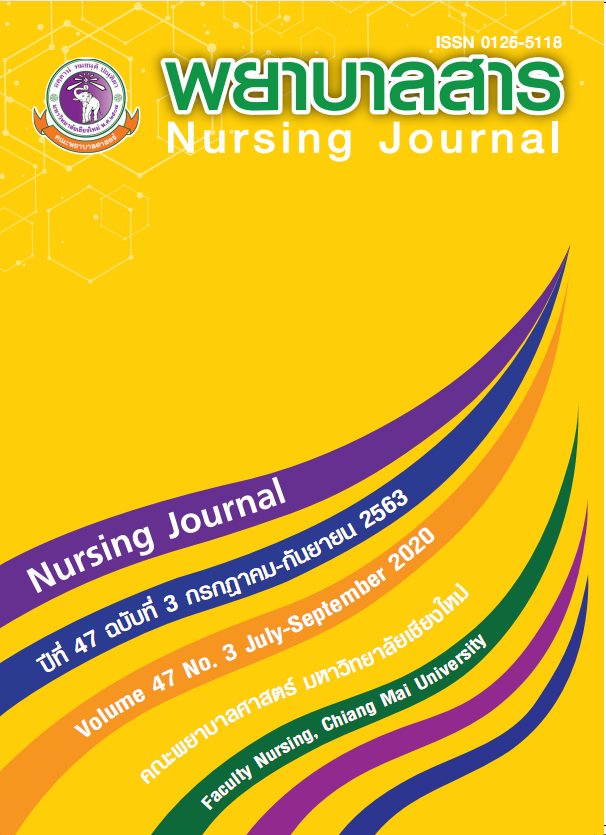Effects of the Buddhist-based Weight Loss Program on Weight Loss Practices and Bodyweight Among Overweight Novice Monks
Keywords:
Buddhist-based weight, Loss program weight loss practices, overweight novice monksAbstract
This quasi-experimental research aimed to examine the effects of a Buddhist-based weight loss program on weight loss practices and bodyweight among overweight novice monks. The sample comprised overweight novice monks who studied in Sarapeepariyatsuksa School, Yang Noeng Subdistrict, Saraphi District, Chiang Mai Province, and Hangdongsung-kharachuphathum School, Hangdong Subdistrict, Hangdong District, Chiang Mai Province. Forty-six people selected according to the criteria were assigned into experimental groups and control groups, with twenty-three participants in each group. The instruments used in this study consisted of a Buddhist-based weight loss program in overweight novice monks, a handbook of knowledge for overweight novice monks, videos and a PowerPoint presentation providing knowledge and demonstrating actions to lose weight, food models and nutrition labels, a weight scale, a book for recording weight, and an action to lose weight for overweight novice monks questionnaire. Data were analyzed using descriptive statistics, the Chi-square test, Fisher’s exact test and the independent t-test.
The results of this study revealed that the mean score of action to food consumption and drinking of overweight novice monks after receiving the Buddhist-based weight loss program was statistically significantly higher than the control group (p<.001). The mean score of action to exercise and weight mean difference after receiving the Buddhist-based weight loss program was not significantly different between the experimental and control groups.
The finding of this study showed that the Buddhist-based weight loss program to support overweight novice monks can promote effective action to lose weight. In addition, novice monks should be included Influence factor exercise in a suitable way to promote effective and sustainable actions of exercise.
References
Boonnak, A., Saengpherm, P., Somjitphaisan, W., Pongsaranakul, Y., & Leelahakul, V. (2012). The effect of dietary and exercise behavior changes in adolescents with overweight. Journal of Medicine Mahidol University, 30(4), 37-48. (In Thai)
Chumkhiew, A. (2019). Effectiveness of a weight control program focused on changing eating behaviors in overweight or obese students. Nursing Journal, 46(3), 106-107. (In Thai)
Department of Health, Ministry of Public Health. (2013). Health manual for novices. (1st ed.). Bangkok: Bureau of Health Promotion. (In Thai)
Dihomsin, W. (2011). Effectiveness of health education program on weight loss in obese junior high school students in Samut Prakan Province. Journal of Health Education, 34(118), 1-19. (In Thai)
Kaewsingam, R. (2017). Nutrition status and dietary behavior of novices studying at Pali Demonstration School, Mahachulalongkornrajavidyalaya University, Sisaket temple, Nong Khai province. Khon Kaen University, 10(1), 28 - 37. (In Thai)
National Health Commission (2017). National Buddhist monk's health statute. Bangkok: Office of the National Health Commission. (In Thai)
Office of Policy and Strategy Ministry of Public Health. (2014). Strategy, indicators and data collection guidelines 2015. Bangkok: Ministry of Public Health. (In Thai)
Panamanee, P. (2017). The effect of a program to reduce obesity behavior by using planned behavior theory on weight loss behavior of school age children with overweight. Vachirasarn Nursing, 19(2), 13-22. (In Thai)
Phachan, S. (2015). Nutritional status and food consumption of monks in Mueang District, Khon Kaen province. Srinakarin Vejsarn, 30(6), 552-561. (In Thai)
Phasukrit, C. (2011). An analytical study of Buddhist principles for the solution of obesity. Master of Buddhism Thesis in Buddhism Program. Graduate School, Mahachulalongkornrajavidyalaya University. (In Thai)
Ruenai, C. (2007). Food nutrition and nutritional status of novices, San Pa Tong District, Chiang Mai Province. Master’s Thesis (Nutrition education program). Graduate School, Chiang Mai University. (In Thai)
Sarnrak, M., Sangwalee, W. & Khaengsri. W. (2017). Prevalence and factors related to chronic illnesses of monks, Warin Chamrap District, Ubon Ratchathani. Science and Technology Journal Ubon Ratchathani University, 19(1), 38-49. (In Thai)
Srifa, S. (2017). Study on health promotion behaviors of monks in Pattani Province. Master of Education Thesis in Curriculum and Instruction. Graduate School, Prince of Songkla University (In Thai)
Sukrueangkun, A. (2017). Factors predicting health promoting behaviors among Buddhist monks in Chiang Rai Province. Nursing Journal, 44(2), 38-48. (In Thai)
Tantiekkarat, S. (2015). The effectiveness of the obesity prevention program on food consumption behavior and behavior: Physical activity of school age children who are overweight. Boromarajonani College of Pharmacy, 31(3), 47-61. (In Thai)
Uttama, P. (2018). Factors affecting obesity of novices at the Phrapariyattidhamma schools, General education department Chiangmai Province. Master’s Thesis of Public Health, College Chiang Mai Rajabhat University. (In Thai)
Wangin, C. (2018). Monks with diabetes are undergoing pressure. Retrieved from http://www.thaihealth.or.th/partnership/Content/44970%E0%B8%9E%E0%B8%A3%E0%B8%B0%E0%B8%.html. (In Thai)
Wipulakorn, A., Anukhra, C., Tanthud, P., & Thirawanwansiri, N. (2018). Self–health care behavior of novice in the Phrapariyattidhamma schools in the northern of Thailand. Journal of Graduate Studies Review MCU Phrae, 4(2), 150-164. (In Thai)
Wongsuebchat, S. (2011). Health care behavior of monks in Bangkok: A case study.
Wat Mahathat Yuwarat Rangsarit Wat Phra Chetuphon Wimon Mangkalaram and Pak Nam Phasi Charoen Temple. Philosophy thesis in Buddhism Program. Graduate School, Mahachulalongkornrajavidyalaya University. (In Thai)
Yang Noeng Health Promoting Hospital. (2018). Report on monitoring of nutritional status of school children Saraphi Buddhist Scripture School Chiang Mai. Yang Noeng Health Promoting Hospital, Saraphi District, Chiang Mai Province. (In Thai)
Downloads
Published
How to Cite
Issue
Section
License
บทความที่ได้รับการตีพิมพ์เป็นลิขสิทธิ์ของวารสารพยาบาลสาร
ข้อความที่ปรากฏในบทความแต่ละเรื่องในวารสารวิชาการเล่มนี้เป็นความคิดเห็นส่วนตัวของผู้เขียนแต่ละท่านไม่เกี่ยวข้องกับมหาวิทยาลัยเชียงใหม่ และคณาจารย์ท่านอื่นๆในมหาวิทยาลัยฯ แต่อย่างใด ความรับผิดชอบองค์ประกอบทั้งหมดของบทความแต่ละเรื่องเป็นของผู้เขียนแต่ละท่าน หากมีความผิดพลาดใด ๆ ผู้เขียนแต่ละท่านจะรับผิดชอบบทความของตนเองแต่ผู้เดียว






